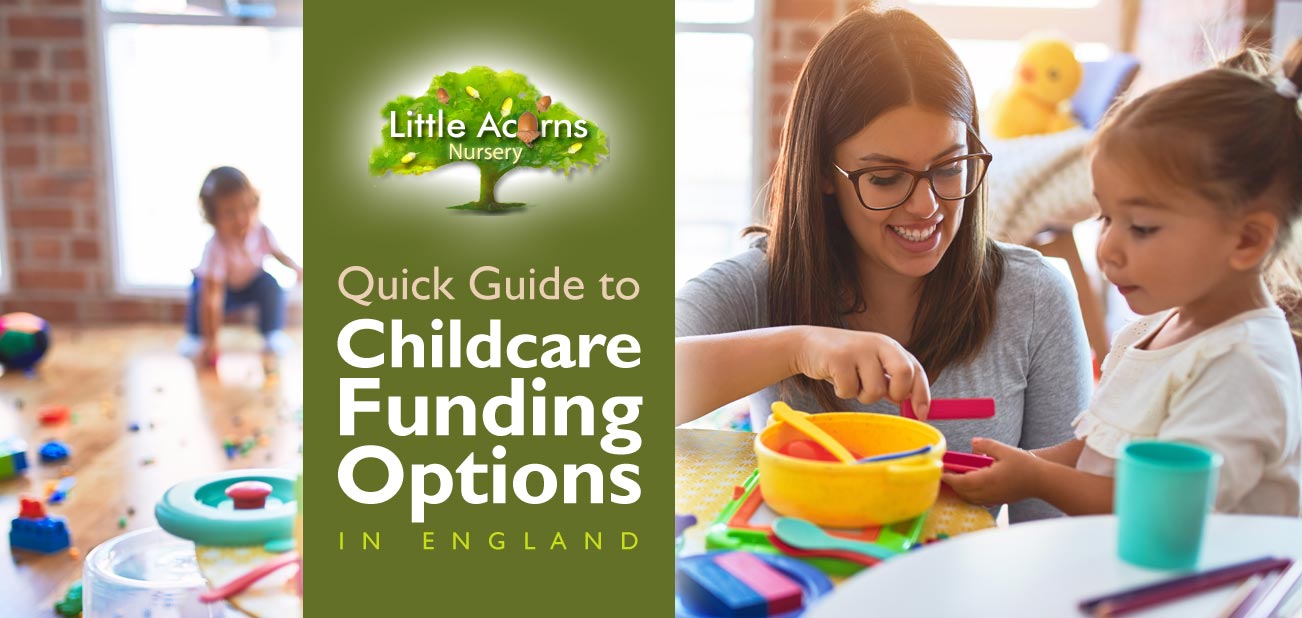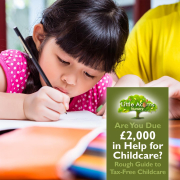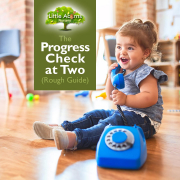Childcare Funding Options (a Quick Guide)

 One of the first challenges when considering childcare for your little one is how to fund it. If you’re an affluent family, then great. However, if childcare costs will be a more significant hurdle to overcome, the good news is that there are lots of options available. Either way, it will help to be well-informed about the various childcare funding schemes on offer from the Government. There are quite a few of them and some are extremely generous and surprisingly easy to obtain. Today’s Quick Guide to Childcare Funding Options in England will give you an at-a-glance overview of what’s available, the key eligibility criteria and how to apply. Note, though, that they generally fund in-person childcare only from approved providers (like Little Acorns). Take a look at the many options …
One of the first challenges when considering childcare for your little one is how to fund it. If you’re an affluent family, then great. However, if childcare costs will be a more significant hurdle to overcome, the good news is that there are lots of options available. Either way, it will help to be well-informed about the various childcare funding schemes on offer from the Government. There are quite a few of them and some are extremely generous and surprisingly easy to obtain. Today’s Quick Guide to Childcare Funding Options in England will give you an at-a-glance overview of what’s available, the key eligibility criteria and how to apply. Note, though, that they generally fund in-person childcare only from approved providers (like Little Acorns). Take a look at the many options …
Childcare Vouchers:
Tax-Free Childcare:
Free Childcare Hours for 2-Year-Olds:
Free Childcare Hours for 3 & 4-Year-Olds:
Tax Credits for Childcare:
Childcare Funding through Universal Credit:
Childcare Funding Options for Students
Students are quite well supported in terms of childcare, with 3 key funding schemes that may help them with childcare costs.
The Student Childcare Grant:
The ‘Learner Support’ Scheme:
The ‘Care to Learn’ Scheme:
Outstanding Childcare in Clayton-le-Woods, Chorley

 Little Acorns Nursery supports all the Government childcare funding options for eligible families. Please do ask us if you need any help clarifying your childcare funding options or with your application — we’ll be happy to help. Little Acorns Nursery and pre-school provides an outstanding, award-winning childcare service in Clayton-le-Woods, Chorley, Central Lancashire (PR6). We’re also conveniently close for those in Clayton Brook, Clayton Green, Thorpe Green, Pippin Street, Buckshaw Village and Whittle-le-Woods. Farington, Bamber Bridge, Lostock Hall, Euxton, Leyland and Penwortham are also nearby.
Little Acorns Nursery supports all the Government childcare funding options for eligible families. Please do ask us if you need any help clarifying your childcare funding options or with your application — we’ll be happy to help. Little Acorns Nursery and pre-school provides an outstanding, award-winning childcare service in Clayton-le-Woods, Chorley, Central Lancashire (PR6). We’re also conveniently close for those in Clayton Brook, Clayton Green, Thorpe Green, Pippin Street, Buckshaw Village and Whittle-le-Woods. Farington, Bamber Bridge, Lostock Hall, Euxton, Leyland and Penwortham are also nearby.
To make an enquiry about a possible place for your child at Little Acorns Nursery, please get in touch:

 You’ve no doubt heard of, or read about, childcare ‘vouchers’. They sound great, but what are they and how do you get them?
You’ve no doubt heard of, or read about, childcare ‘vouchers’. They sound great, but what are they and how do you get them? Tax-Free Childcare is a great scheme which, in contrast to childcare vouchers, is widely available to working families — even for those with relatively high earnings.
Tax-Free Childcare is a great scheme which, in contrast to childcare vouchers, is widely available to working families — even for those with relatively high earnings. Certain 2-year-olds are eligible for 15 hours of free childcare each week, through another Government scheme. This one is to help primarily those families on benefits.
Certain 2-year-olds are eligible for 15 hours of free childcare each week, through another Government scheme. This one is to help primarily those families on benefits. 3 and 4-year-olds in England are very well catered for when it comes to free childcare funding. This is aimed to help them receive that all-important early years education and to help those parents wishing to return to the workplace.
3 and 4-year-olds in England are very well catered for when it comes to free childcare funding. This is aimed to help them receive that all-important early years education and to help those parents wishing to return to the workplace. Tax Credits specifically for childcare are only available to existing claimants under the scheme, through ‘Working Tax Credits’. New claimants should instead refer to the ‘Childcare Funding through Universal Credit’ section below.
Tax Credits specifically for childcare are only available to existing claimants under the scheme, through ‘Working Tax Credits’. New claimants should instead refer to the ‘Childcare Funding through Universal Credit’ section below. For those who are eligible, this is quite a generous scheme that allows them to reclaim* as much as 85% of their childcare costs. The maximum available, however, is £646.35* each month for one child, or it’s £1108.04* for more than one.
For those who are eligible, this is quite a generous scheme that allows them to reclaim* as much as 85% of their childcare costs. The maximum available, however, is £646.35* each month for one child, or it’s £1108.04* for more than one. This is a grant that does not need to be repaid and is in addition to any undergraduate Student Finance.
This is a grant that does not need to be repaid and is in addition to any undergraduate Student Finance. Learner Support is a type of financial support designed for students who are suffering financial hardship. It can be used to fund childcare for eligible students who are also parents.
Learner Support is a type of financial support designed for students who are suffering financial hardship. It can be used to fund childcare for eligible students who are also parents. Care to Learn may suit if you are a parent who is not yet 20 and are studying on a publicly-funded course, although see caveats below.
Care to Learn may suit if you are a parent who is not yet 20 and are studying on a publicly-funded course, although see caveats below.









